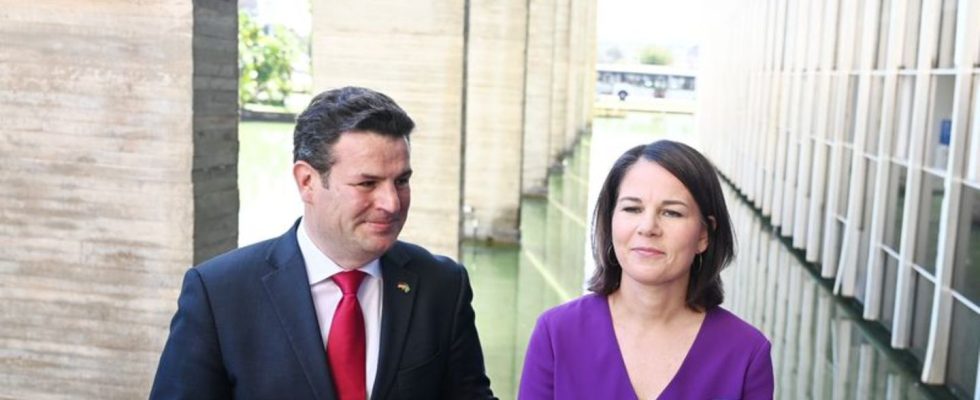diplomacy
Baerbock and Heil in São Paulo – economic issues in focus
After their visit to Brasilia, Federal Foreign Minister Annalena Baerbock (Greens) and Federal Labor Minister Hubertus Heil (SPD) will travel on to São Paulo. photo
© Annette Riedl/dpa
Day two of Foreign Minister Baerbock’s and Labor Minister Heil’s visit to Latin America: they are going to a German manufacturer that builds electric buses. And again about dependence on China.
Federal Foreign Minister Annalena Baerbock and Labor Minister Hubertus Heil are continuing their joint visit to Brazil today with a visit to the economic metropolis of São Paulo. Among other things, the Greens politician and her SPD colleague want to visit a Brazilian Mercedes-Benz plant that builds buses with electric drives. It should also deal with problems in the production of batteries and dependencies on China.
Brazil is the fifth largest country in the world, covers almost half the area of the South American continent and, with around 215 million inhabitants, is Germany’s most important trading partner in South America. It is also the only country in the region with which Germany has had a strategic partnership since 2008. Brazil has immense reserves of raw materials and is therefore also important for German industry. This also applies to special metals and minerals that are used in the areas of renewable energies, electromobility and lightweight construction.
With around 1000 German companies, the São Paulo region is one of the largest German industrial locations abroad. In particular, companies from the vehicle and supplier industry, many German corporations, but also the Goethe Institute, political foundations and German schools abroad are represented there.
Mercedes manufactures electric buses in São Paulo
Mercedes-Benz do Brasil is the largest bus and truck producer in Latin America. The bus plant in São Bernardo do Campo in the state of São Paulo was opened in 1956 and specializes in the development and production of bus chassis.
Mercedes-Benz produces the eO500U electric bus there, for example. The company expects demand for electric buses in Brazil to increase from around 1,000 currently to 3,000 vehicles in 2024. Most e-buses in Brazil are in the metropolis of São Paulo: The city wants to use 2,600 electric buses by 2024.
The visit by Baerbock and Heil is also likely to be about Brazil’s strong economic dependency on China. China has been the country’s most important trading partner since 2009. During a visit by Brazil’s President Luiz Inácio Lula da Silva to China in mid-April, there was another clear rapprochement with the signing of 20 bilateral agreements. For China, Brazil is primarily important for the procurement of raw materials, but also for agricultural products.
“Festival of Digital Democracy”
To kick off their appointments in São Paulo, Baerbock and Heil wanted to give speeches on democracy and digitization at a “Festival of Digital Democracy” in one of the most important think tanks in Latin America, the FGV. The Fundação Getulio Vargas (FGV) is a university of administration, economics and law.
In the afternoon (local time) a meeting between Baerbock and Heil with the governor of São Paulo, Tarcisio de Freitas, was on the agenda. Freitas belongs to the Republican party of ex-President Jair Bolsonaro and was Minister of Infrastructure under him. An environmental agreement was then to be signed by representatives of German companies.
Before the flight to the northern Brazilian city of Belém in the evening, the German ministers wanted to talk to nurses in an intensive care unit in a hospital. Here, too, like the day before in the capital Brasília, it should be about recruiting nursing professionals for Germany.

